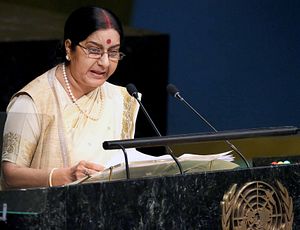There are many ways to eulogize the recently deceased Sushma Swaraj, the former Indian minister of external affairs. Perhaps the most fitting image that comes to mind is how she traversed miles across the globe and achieved great distances in Indian diplomacy all in her 9-yard sari – the quintessential 9-yard sari.
Swaraj was a woman of many firsts. At the age of 25, she was the youngest cabinet minister in the Haryana government. She later became the first woman chief minister of Delhi, the first woman spokesperson for any national political party in the country, first woman leader of the opposition, and the first woman external affairs minister to a complete a full five-year term. She remains the only female MP in India to be honored with the Outstanding Parliamentarian Award.
As one of the key veterans of the Bharatiya Janata Party, she was set up to get a key portfolio when the Narendra Modi-led party stormed to a landslide victory in 2014. Sure enough, Swaraj was assigned the corner office in New Delhi’s famed South Block as the minister of external affairs.
There was a sense of uncertainty back then regarding what India’s foreign policy would look like under Modi, the supposedly inward-looking former chief minister of Gujarat. But Modi effectively rebranded himself as the global Indian ambassador and became the face of Indian diplomacy, circumnavigating the globe and meeting more world leaders than his Twitter timeline could handle. There was a slight concern that Swaraj’s role would be relegated to obscurity with Modi doing the bulk of the frontline diplomacy talks. But Swaraj never competed for the limelight; instead she complemented her boss in a rather unique manner.
While Modi eloquently explained that India’s view of the world and its foreign policy would have its roots in the philosophical belief of Vasudhaiva Kutumbakam (a Sanskrit phrase that translates to “the world is one family”), Swaraj espoused that ideal in a different sense.
She literally helped families in distress by making her Twitter account a help hotline for those who needed to expedite their queries. Indian bureaucracy had been enmeshed in the belief that there are too many people who want too many things and too many labyrinths to negotiate through to get something done. Not with Swaraj.
Passport or visa problems? Tweet at Swaraj. Stranded in a foreign land? Tweet at Swaraj. Unfortunately detained by local authorities overseas? Tweet at Swaraj. Her altruism and affability went even as far as foreign nationals, most notably Pakistanis who needed medical visas. Such was her ability, that she could effectively bifurcate diplomatic duty and compassion. One such example was when she excoriated famed Pakistani minister Sartaz Aziz (former Prime Minister Nawaz Sharif’s former advisor on foreign affairs) over a diplomatic brouhaha, yet on the same day issued medical visas to helpless Pakistanis in need of open-heart surgery. For Indians abroad and at home, Swaraj was only one tweet away, accentuating a new era where the common Indian didn’t need to grease palms or know higher ups in government offices to get their minister’s ear.
A legal eagle, her oratory skills in Hindi were second to none, and often seen to be in the same league as her fellow party stalwarts, late Prime Minister Atal Bihari Vajpayee and Modi. Her fiery speeches in Parliament and at the United Nations won her many accolades.
She gave a fitting riposte to Sharif’s cry (citing the murder of Hizbul terrorist Burhan Wani) over alleged Indian brutalities in Kashmir as Pakistan’s dastardly attempt to use terrorism to gain territory. Her powerful rebuke of Pakistan at the UN General Assembly saw her question Pakistan’s own internal development and its home base for nefarious terror camps, while India had focused on its own internal development producing world-class educational bastions.
She handled many such strategically sensitive issues with Pakistan, including the Kulbhushan Jadhav saga. Her masterstroke was evinced when she escalated the matter to the International Court of Justice to successfully get a stay on his execution. Famed lawyer Harish Salve, who is presently defending the Indian national, said he was so impressed that when Swaraj asked him his fee, he said it would be the princely sum of one rupee. Along with several Indian diplomats, she earned praise for carefully shepherding India through the 70-day Doklam standoff with China.
Her tenure as the face of Indian diplomacy saw her carry her ‘Indianness’ with grace. Her profession took her around the world, but her Indianness came with her. Swaraj embodied the quintessential Indian woman look, with the bindi always on her forehead, the subtle low bun, the colorful bright red sindoor, and vibrant saris adding to her eloquence and panache.
In Pakistan, it was said that saris went out of vogue when the late military dictator Zia-Ul-Haq declared the garment as un-Islamic, yet Swaraj didn’t stand on ceremony and wore it proudly in her multiple visits to Islamabad. The Pakistani establishment today is so embittered with the recent announcement in India pertaining to Article 370 that there has been no formal statement of condolence, except for a tweet from Science and Technology Minister Fawad Chaudhary. But there are many in Pakistan who are indebted to Swaraj’s compassion.
Sushma Swaraj, in her previous role as union health minister, set up and gave new life to six branches of the All India Institute of Medical Sciences (AIIMS). Ironically, years later she would take her last breath in the main AIIMS campus in New Delhi.
Swaraj once tweeted that even if an individual who needed assistance happened to be stuck on Mars, the “Indian Embassy there will help.” India’s space agency may have a long way to go before they can set up a base on Mars, but Sushma Swaraj showed that she was certainly out of this world.
Akshobh Giridharadas was based out of Singapore as a reporter and producer with Channel News Asia. He tweets at @Akshobh.

































